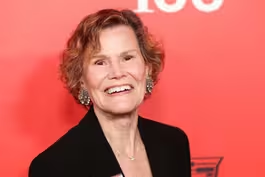
Base renamed as military plans to stop honoring Confederacy
Clip: 4/27/2023 | 8m 42sVideo has Closed Captions
Army base renamed after Black veterans as military plans to stop honoring Confederates
For the first time, U.S. Army bases will be named after women and Black officers instead of only white men. Fort Lee, named for Robert E. Lee, became Fort Gregg-Adams for two Black officers who made significant contributions to the Army. It is one of nine renamed bases, part of a Congressional and military effort to commemorate American heroes rather than traitors. Nick Schfirin reports.
Problems playing video? | Closed Captioning Feedback
Problems playing video? | Closed Captioning Feedback
Major corporate funding for the PBS News Hour is provided by BDO, BNSF, Consumer Cellular, American Cruise Lines, and Raymond James. Funding for the PBS NewsHour Weekend is provided by...

Base renamed as military plans to stop honoring Confederacy
Clip: 4/27/2023 | 8m 42sVideo has Closed Captions
For the first time, U.S. Army bases will be named after women and Black officers instead of only white men. Fort Lee, named for Robert E. Lee, became Fort Gregg-Adams for two Black officers who made significant contributions to the Army. It is one of nine renamed bases, part of a Congressional and military effort to commemorate American heroes rather than traitors. Nick Schfirin reports.
Problems playing video? | Closed Captioning Feedback
How to Watch PBS News Hour
PBS News Hour is available to stream on pbs.org and the free PBS App, available on iPhone, Apple TV, Android TV, Android smartphones, Amazon Fire TV, Amazon Fire Tablet, Roku, Samsung Smart TV, and Vizio.
Providing Support for PBS.org
Learn Moreabout PBS online sponsorshipGEOFF BENNETT: For the first time in history, U.S. Army bases will be named after women and Black officers, instead of only white men.
Today, Fort Lee, named for General Robert E. Lee, became Fort Gregg-Adams for two Black officers who made significant contributions to the Army.
It is one of nine renamed bases, part of a congressional and military effort to change Confederate names and honor American heroes.
Nick Schifrin is back with that story.
NICK SCHIFRIN: Until today, the U.S. Army's third largest training site was named for the slave-owning commander of the Confederate Army.
Nearly 160 years after Robert E. Lee's surrender, Fort Lee surrendered his namesake traitor to commemorate two trailblazers.
LT. GEN. ARTHUR GREGG (RET).
U.S. Army: I hope that this community will look with pride on the name Fort Gregg-Adams and that the name will instill pride in every soldier entering our mighty gates.
GEOFF BENNETT: Ninety-year-old Lieutenant General Arthur J. Gregg enlisted in the Army in 1946.
He wanted to be a lab technician, but faced racial barriers, so went into logistics.
He graduated from officer candidate school and retired after 36 years as the military's highest-ranking Black officer, his first assignment at the base that now bears his name with its whites-only officers club, which is also now named for him.
The base also commemorates the late Lieutenant Colonel Charity Adams, who commanded the first and only unit of mostly Black women officers to serve overseas during World War II.
It's all part of an effort to rename nine bases and hundreds of other military assets whose names celebrate the Confederacy, among them, Fort Bragg renamed Fort Liberty, Fort Hood renamed for Richard Cavazos, the Army's first ever four-star general of Hispanic descent, and Fort A.P.
Hill renamed for Mary Edwards Walker, a Civil War surgeon who became a prisoner of war and the only woman ever to receive the Medal of Honor.
The naming commission was chaired by retired Navy Admiral Michelle Howard, the Navy's first female four-star and the first Black woman to command a U.S. Navy ship.
I spoke to her yesterday.
Welcome to the "NewsHour."
ADM. MICHELLE HOWARD (RET.
), U.S. Navy: Thank you, Nick.
NICK SCHIFRIN: Why, overall, is this renaming important?
ADM. MICHELLE HOWARD: After the George Floyd murders, many states started to rethink our vision and the memories of the Civil War.
At the federal level, Congress realized that naming an asset, a building or ship after someone honors them, commemorates them.
And the people who fought for the Confederacy were traitors.
They waged war against the United States.
So, those names should be removed or replaced with names of people who have remained faithful to the United States.
Our military bases are important symbols of might and right of the United States.
And the names that are on the base signs, the names that are on our ships should reflect the values of our country and the values of the American people.
NICK SCHIFRIN: You acknowledge in your report that, as you and your commissioners did your work, you were criticized for -- quote -- "erasing history."
But you write this.
You write: "History is about who we were.
Commemoration is about who we strive to be."
What do you mean?
ADM. MICHELLE HOWARD: When you name an asset for an individual, you're elevating them.
It's someone you want to look up to and remember for their heroic acts or for their example of leadership.
History is the retelling of the facts.
We're not looking at changing DOD school books.
But we are looking to have names now that, when a sailor serves on a ship, or a soldier serves on a base, or an airman serves on a base, they can look up and learn about that person, and be inspired to be a better military member.
NICK SCHIFRIN: You acknowledge that many of the bases named for Confederate leaders have far more to do with the culture under which they were named than they have with the historical acts of their namesakes.
How so?
ADM. MICHELLE HOWARD: After the Civil War, there was not a naming of Confederates.
There were no symbols.
They weren't considered traitors by those who had stayed with the U.S. Army and by our government.
These installations that we looked at, they were named in World War II.
And the idea of the Army, Department of War at the time was that we should name bases in the South after Confederate generals and bases in the North after Union generals to help create patriotism.
What's obvious in that statement is, they are forgetting about all of the Americans who are either African American or other communities that the naming after Confederate generals is not inspiring.
It completely ignored their perspectives.
NICK SCHIFRIN: For years, the Army fought some of these efforts.
ADM. MICHELLE HOWARD: Yes.
NICK SCHIFRIN: We went back to 2017 and found a statement that removing the names of Robert E. Lee and Stonewall Jackson from a base in New York would be -- quote -- "controversial and divisive."
The debate, I think, still goes on.
I don't want to be political, but I'm going to bring up one tweet here.
President Trump vetoed the National Defense Authorization Act, in part objecting to a provision that required changes to bases named after Confederate leaders.
And he said: "These monumental and very powerful bases have become part of a great American heritage.
Our history as the greatest nation in the world will not be tampered with."
Do you think today the debate is ongoing?
ADM. MICHELLE HOWARD: So you start with the veto?
I start with the fact that the veto was overturned, in a very strong bipartisan manner, that the elected officials of this country understood that this was something that needed to be looked at.
NICK SCHIFRIN: And needed to be reckoned with and fixed?
ADM. MICHELLE HOWARD: We have had reckonings over the aftermath of slavery in the Civil War, but I'm not sure we have ever had reconciliation.
And, in some ways, the work Congress charted the commission to do starts us down the path of reconciliation.
NICK SCHIFRIN: And yet, regardless of these changes, how large of a challenge is reverence of the Confederacy?
Indeed, how large of a challenge does racism continue to be in the U.S. military?
ADM. MICHELLE HOWARD: You know, the military is made up of humans, and they are wonderful individuals, but I will be the first to say, we're not saints.
And so we carry our own beliefs and prejudices and biases with us.
NICK SCHIFRIN: But some have argued that these issues, whether of reverence for the Confederacy, whether of racism, are actually institutional.
ADM. MICHELLE HOWARD: The country's changed quite a bit.
Our laws have changed over the years.
Our policies have changed over the years.
It is remarkable we're having this conversation in the 75th anniversary of Truman's Armed Forces Integration Act, Truman's act that allowed women to now serve on active-duty in the military.
Our military reflects the change in the law.
And our military reflects the changes in the Constitution.
NICK SCHIFRIN: And those changes need to be ongoing?
ADM. MICHELLE HOWARD: I don't know if our founding fathers thought of the Constitution as a living, breathing document that would become more encompassing of all of her citizens and expand the rights to all Americans, but that is what is happening.
And so this democracy continues to evolve.
But I think, the better it evolves, it just continues to make our country greater.
NICK SCHIFRIN: Retired Admiral Michelle Howard, thank you so much.
ADM. MICHELLE HOWARD: Thank you Nick.
Battle between Disney and DeSantis now playing out in court
Video has Closed Captions
Clip: 4/27/2023 | 7m 1s | Battle between Disney and DeSantis now playing out in court (7m 1s)
Confusion surrounding Twitter's verified account changes
Video has Closed Captions
Clip: 4/27/2023 | 6m 42s | The confusion and risks surrounding Twitter's verified account changes (6m 42s)
Judy Blume on new film adaptation of her classic book
Video has Closed Captions
Clip: 4/27/2023 | 7m 51s | Judy Blume on new film adaptation of her classic 'Are You There, God? It’s Me, Margaret' (7m 51s)
Prosecutors say accused leaker has history of violence
Video has Closed Captions
Clip: 4/27/2023 | 4m 42s | Prosecutors accuse guardsman in intelligence leak of history of violence and threats (4m 42s)
Restaurant helps diners think deeply about immigrant culture
Video has Closed Captions
Clip: 4/27/2023 | 5m 52s | How a restaurant is helping diners think deeply about immigrant culture and food (5m 52s)
What new GDP numbers say about strength of U.S. economy
Video has Closed Captions
Clip: 4/27/2023 | 5m 23s | What the latest GDP report says about the strength of the U.S. economy (5m 23s)
Providing Support for PBS.org
Learn Moreabout PBS online sponsorship
- News and Public Affairs

FRONTLINE is investigative journalism that questions, explains and changes our world.

- News and Public Affairs

Amanpour and Company features conversations with leaders and decision makers.












Support for PBS provided by:
Major corporate funding for the PBS News Hour is provided by BDO, BNSF, Consumer Cellular, American Cruise Lines, and Raymond James. Funding for the PBS NewsHour Weekend is provided by...





